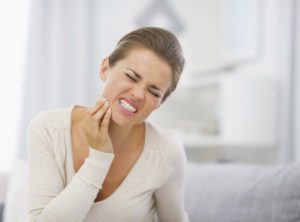Teeth grinding or bruxism is a condition in which a person grinds or clenches their teeth. You may not even be aware of this behavior because it can occur during your sleep. Additionally, many people grind their teeth when they are stressed or anxious. While there are mild cases of bruxism, your teeth still experience damage. Over time, you risk developing tooth decay or even losing your teeth.

Temporomandibular Joint Disorder (TMJ)
Over time, you can develop other dental issues as a result of teeth grinding, including TMJ. The temporomandibular joint is responsible for the hinging movement of your jaw. When pain disrupts the movement of the joint, dentists call this a disorder or TMJ. With mild cases of TMJ, you may hear a popping or clicking sound in your jaw as you open and close your mouth. If it gets worse, you can experience pain or dysfunction of the joint. Advanced cases of TMJ can affect your ability to eat or speak.
TMJ can occur as a result of grinding your teeth. Unfortunately, bruxism adds excess strain to your jaw, which can overwork the joint. Over time, this can damage the cartilage, causing pain or dysfunction. Additionally, grinding your teeth can add more pain to the muscles.
Excess pressure is not a function your jaw usually withstands. Therefore, it creates a pain in your jaw that can radiate through your face. In fact, the pain can make your face sensitive to touch. Or, you may feel a pain that feels like an earache, but it is not actually an earache. It is simply pain referring to your jaw.
Worn Teeth
One of the reasons it is essential to address teeth grinding is because it can cause long-term damage. Even mild cases of bruxism will damage the surfaces of your teeth. While the enamel that coats your teeth is the strongest tissue in your body, it cannot bear the stress of grinding your teeth. Grinding is a form of erosion. In a similar way that acid chemically erodes your teeth, grinding your teeth removes your enamel.
Over time, grinding your teeth will alter the shape and structure of your teeth. Unfortunately, this has more side effects other than aesthetics. Because bruxism damages your enamel, you are at an increased risk of developing tooth decay. This is because your enamel can no longer defend against bacteria.
Chipped or Broken Teeth
Another problem that occurs with bruxism is chipped or broken teeth. When you grind your teeth, you put extra stress on your teeth. Unfortunately, this can lead to fractures or breaks in your teeth. Any damage to the enamel, especially breaks, increases your chance of developing tooth decay. The enamel prevents bacteria from entering the “live” portion of your teeth. Chips and fractures allow bacteria to move into your tooth, causing decay.
When this happens, you must seek treatment from your dentist. This will help stop the decay and restore the look and structure of your teeth.
